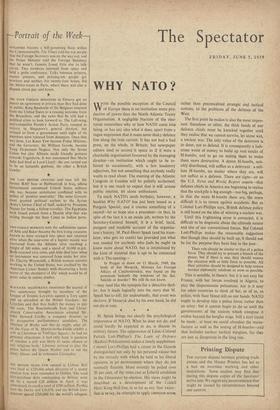WHY NATO?
WITH the possible exception of the Council of Europe there is no institution more pro- ductive of yawns than the North Atlantic Treaty Organisation. A negligible fraction of the elec- torate remembers why or how NATO came into being, or has any idea what it does, apart from a vague impression that it mans some shaky defence line along the iron curtain. It has not had a bad press, on the whole, in Britain; but newspaper editors tend to accord it space as if it were a charitable organisation favoured by the managing director—an institution which ought to be re- ferred to occasionally, with a few laudatory adjectives, but not something that anybody really wants to read about. The meeting of the Atlantic Congress in London will be politely acclaimed; but it is too much to expect that it will arouse public interest, let alone enthusiasm.
To mark NATO's tenth birthday, however, a booklet Why NATO? has just been issued as a Penguin Special; and it creates something of a record—let us hope also a precedent—in that, in spite of the fact it is an inside job, written by the Secretary-General himself, it is a brief, lucid, pungent and readable account of the organisa- tion's history. M. Paul-Henri Spaak (and his trans- lator, who gets no credit) has provided just what was needed for anybody who feels he ought to know more about NATO, but is intimidated by the kind of material that is apt to be connected with it. The opening— In Prague at dawn on 13 March, 1949, the body of Jan Masaryk, Minister for Foreign Affairs of Czechoslovakia, was found on the pavement beneath the windows of his flat. Suicide or murder? We still do not know.
—may read like the synopsis for a detective thril- ler, but it leads logically into the story that M. Spaak has to tell; for undoubtedly, that event was decisive. If Masaryk died by his own hand, he did not die in vain.
• M. Spaak brings out clearly the psychological importance of NATO. What he does not do, and could hardly be expected to do, is discuss its military future. The appearance of Lieut.-Colonel Patrick Lort-Phillips's The Logic of Defence (Radical Publications) makes a timely supplement. Colonel Lort-Phillips had a career in the Guards distinguished not only by his personal valour but by the tenacity with which he held to his liberal opinions in an environment where they do not normally flourish. More recently he polled over 20 per cent. of the votes cast as Liberal candidate in the Gloucester by-election. His views might be described as a development of the 1.iddell Hart/ King-Hall line, in so far as any 'line' exists: that is to say, he attempts to apply common sense, rather than preconceived strategic and tactical , notions, to the problems of the defence of the West.
The first point he makes is also the most impor- tant. Somehow or other, the thick heads of our defence chiefs must be knocked together until they realise that we cannot survive, let alone win, a nuclear. war. The only value of the deterrent is to deter, not to defend. It is consequently a ludi- crous waste of money to build up vast stocks of H-bombs, and to go on testing them to make them more destructive. A dozen H-bombs, suit- ably distributed, will suffice as a deterrent: a mil- lion H-bombs, no matter where they are, will not suffice as a defence. There are signs—or so the U.S. News and World Report asserts—that defence chiefs in America are beginning to realise that the stockpile is big enough—too big, perhaps, in that the more H-bombs there are, the more difficult it is to insure against accidents. But as Colonel Lort-Phillips says, British defence policy is still based on the idea of winning a nuclear war.
Until this frightening error is corrected, it is difficult to be dogmatic about the ultimate nature and size of our conventional forces. Bu i Colonel Lort-Phillips makes the reasonable suggestion that though they should be built up, it should not be for the purpose they have had in the past:
Their role should be similar to that of a police force. They should try to prevent a breach of the peace; but if there is one, they should restore the situation with as little force as possible. All
their activities should be designed to help restore
normal diplomatic relations as soon as possible.
This is sensible, in theory; but it is not easy for France, with her forces involved in Algeria, to play the dispassionate policeman; nor is it easy for other countries to think of her, or of us, as police, with Suez blood still on our hands. NATO ought to develop into a police force, rather than an army; but it cannot begin to do so until the governments of the nations which compose it evolve beyond the burglar stage. Still a start could be made : at least we could abandon the manu- facture as well as the testing of H-bombs—and that includes nuclear tactical weapons, for they are just as dangerous in the long run.






































 Previous page
Previous page